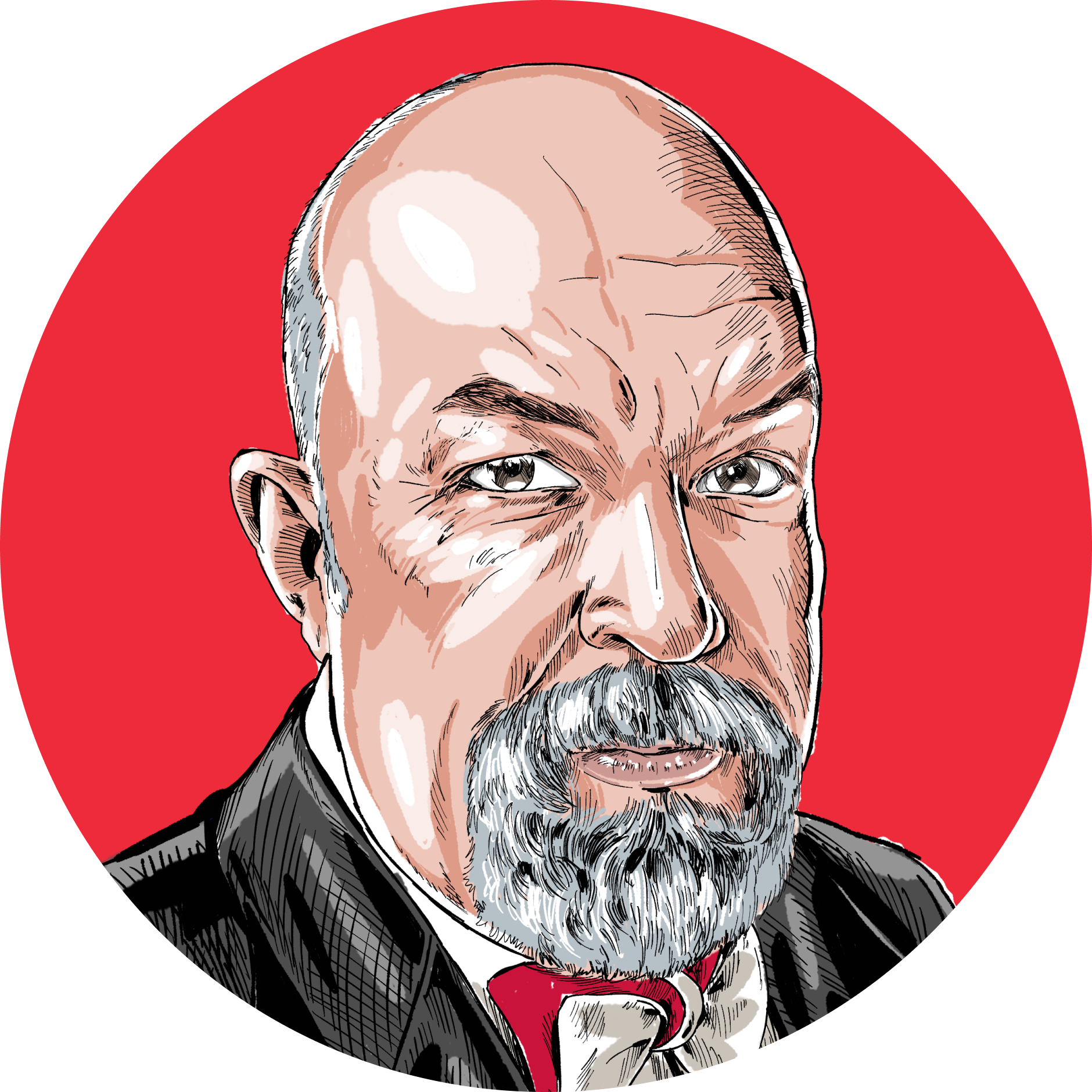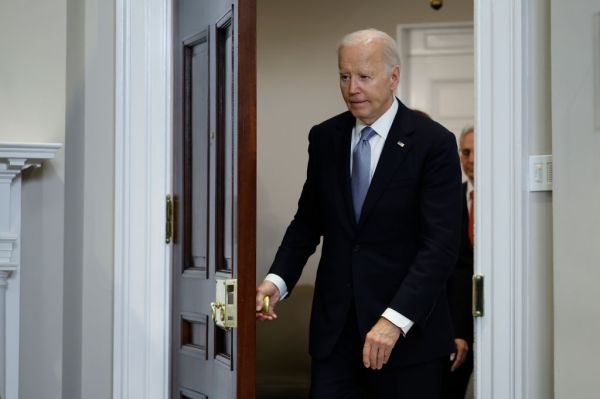Tomorrow is Election Day, and as Americans prepare to go to the polls—or not!—it is worth spending some time thinking about the fact that the characteristic quality of politics in our time is not populism, nationalism, socialism, illiberalism, or anything of that nature: It is immaturity.
Depending on how you do the math, the United States may boast of having the world’s oldest continuous democracy or its oldest codified constitution. (San Marino will complain, but I think the United States has the better claim.) But countries that have been around for a long time act the fool periodically—being long-lived is not the same as being mature. I am 50 years old, and during the course of my relatively brief years on this Earth, a lot of countries that we think of as being utterly normal—Spain, Portugal, Greece—were in thrall to some variety of fascist dictatorship or another: Francisco Franco ruled Spain until 1975, António de Oliveira Salazar kept Portugal under his heel until 1974, the Colonels’ junta ruled Greece until 1974. And just as those European countries were emerging from dictatorship in the mid-1970s, India—the world’s largest democracy—was sliding into dictatorship under Indira Gandhi and the “Emergency.” Liberty has been the exception: 16 million Germans lived under a brutal dictatorship until 1989, the “perfect dictatorship” ran Mexico until 2000, etc. If you take the span of my late father’s life rather than mine—84 short years—then you’d have an easier time counting the European countries that hadn’t been under some form of dictatorship at some time during that period than adding up the ones that had. And it wasn’t just the Nazis and the Soviets: If Charles de Gaulle wasn’t a dictator, then the words “rule by decree” have no meaning.
The English-speaking countries and a couple of small outliers (happy Switzerland) have enjoyed a run that is, in the historical context, very, very unusual. If you want to know what it is that American conservatives have conserved and mean to conserve, it is those aspects of our national life that have ensured that even when they achieve some measure of electoral success, such figures as Huey Long in days of old—or Bernie Sanders and Donald Trump in our own time—do not succeed in their revolutionary ambitions. Even Woodrow Wilson and Franklin Roosevelt, each of whom took advantage of crisis and war to assume the closest thing to practical autocratic powers wielded by an American president, saw the most radical of their ambitions thwarted and many of their advances reversed. (FDR’s program has proved more durable than Wilson’s, in part because many conservatives ultimately embraced it.) The Anglophone world has a particular liberal mojo, expressed more intensely in the United States than elsewhere but obviously present in some considerable degree in the United Kingdom, Australia, New Zealand, and Canada. And that is worth conserving.
Which is to say: You can count me out of the right-wing revolutionary talk.
I concur with Jonah Goldberg in his response to the such recent talk on the right as “We need to stop calling ourselves conservatives.” Basically: “Your proposal is acceptable.” I think these idiot children should stop calling themselves “conservative” too, and they would be saving me some trouble. No, not everyone engaged in that “revolution” talk is an idiot child, but the non-idiot-children should stop calling themselves “conservative” too. And many in that camp have: Sohrab Ahmari, the secular-Muslim-socialist-atheist-turned-neocon-turned-Trumpy-ultramontane-Catholic-whackadoodle-turned-New-Deal-Democrat—seriously, the guy has maintained an unlikely series of exotic positions that would have exceeded the capacities of the Yogi Coudoux and Stormy Daniels combined—wants to be known as a radical, and currently is operating a “radical American journal” with a likeminded Marxist, thereby melding the cutting-edge progressive ideas of the 1930s with the freshest revolutionary thinking of the late 19th century. I’ve gone back and forth with Ahmari on this stuff for a while (we did an event at Yale in 2019) and my impression of his rather diagonal progress has not changed very much: He seems to me a smart, unserious guy without anything particularly interesting to say. I take it he’s calling himself a “pro-life New Dealer” these days, perhaps with a touch of irony. My understanding is that most of the original New Dealers were pro-life, too, pro-abortion sentiment having been a much more Republican thing in those years. (About half of the domestic politics of the first third of the 20th century can be understood by keeping in mind that the Democrats were the anti-black party and the Republicans were the anti-Catholic party.) This ascendant social-democratic tendency on the right is what some of the political-“science” types describe as “welfare chauvinism,” a combination of redistributionist economics with rightist-to-reactionary social posturing, the kind of thing associated with such figures as Marine Le Pen.
(Of course it’s posturing: I’ll believe these people are serious social reactionaries when they start repealing no-fault divorce laws and bringing back lawsuits over “criminal conversation.”)
Radical is just the right word in many of these cases. For one thing, the word radical refers to roots, and most of these guys talk and think like they have been chewing on some very choice roots from deep down in the Amazon basin that go for about $600 a bundle if you know a guy in Austin. (I used to know a guy in Austin—strange times out there on Bart’s Landing.) But the metaphoric sense obviously is at play as well: They believe that there is something wrong with our society at its root, and that what ails us must be dug up by the roots.
So, reform is out. Bipartisanship and consensus definitely are out. In with the revolution.
No, thanks.
The revolution talk is fundamentally unserious and fundamentally immature. It is partly the result of marketing necessities in the social media age, in which an exceedingly childish understanding of consistency and its flipside—an exceedingly childish understanding of hypocrisy—push all politics into an all-the-way attitude. We always understand that this is stupid when it comes from somebody who disagrees with us: You’ve all met the sandal-wearing imbecile who insists: “You like the interstate highways? You like public schools? Then you’re a socialist, just like me!” (I believe it was none other than Ludwig von Mises who stormed out of a meeting of the Mont Pèlerin Society denouncing the sundry Milton Friedman types gathered there as “socialists.” No pleasing some people.) We have the expression, “Give him an inch and he’ll take a mile” precisely because inches and miles are different things.
This is part of a more general valorization of rebelliousness in our culture, something that probably is inevitable in a society that 1) was founded in a revolution; 2) invented the “teenager” as a social category; and 3) invented rock ’n’ roll.
(The insistent conservatism of rock music is a theme of mine that I’ll have to explore at some length. Short version: Early rock was full of conservative myth-making, from Horatio Alger-type stories such as “Johnny B. Goode” to odes to domesticity such as “You Never Can Tell,” both by Chuck Berry, while punk was mostly a musically reactionary reversion to 1950s pop forms, and by 1978 you have bands as different as the Clash and Dire Straits releasing nearly simultaneous “Kids These Days”-type songs, “White Man in Hammersmith Palais” and “Sultans of Swing,” respectively. It’s a long argument.)
That youthful rebellion-as-national-ethos stuff makes for a pretty good story, and some of it is even true. But a lot of it is marketing, too. Those early Silicon Valley idealists building the future in California garages? Yeah, that really did happen, but it mostly involved a lot of well-heeled Ivy League types backed by dad’s money—which is great! That’s what family money is for!—and a lot of the heavy lifting was done by pillars of the establishment: bankers, tenured professors, and serial entrepreneurs reinvesting the proceeds of earlier successes. For some reason, the political pages have been full of “Why Is Generation X So Republican?” stories in the past few months, but the real question is: Why wouldn’t they be? They watched prosperity emerge from the wreckage of the Cold War while most of what is best in the modern world was built by swaggering capitalists backed by grim-faced bankers and rapacious Wall Street types. It wasn’t pretty, but it worked. One might more reasonably ask why the Republican Party isn’t as Republican as it used to be.
The American Revolution—that thoroughly bourgeois, elite-led revolution based on property rights and Anglo-Protestant liberalism—is the great exception to the revolutionary rule. Normally, revolutions produce only damage, or mostly damage. They leave societies poorer, more fragile, more vulnerable, and less able to access longstanding and familiar modes of dealing with the complexities and challenges of modern life. The American Revolution in many ways begat the French Revolution, which was a disaster; the French Revolution inspired the Russian Revolution, which produced one of the most inhumane regimes every to disgrace this planet; the Russian Revolution provided inspiration for the Iranian Revolution, which the Iranian people appear ready to shake off even as the Biden administration continues to legitimize the tyrants in Tehran.
People learn. Rock stars love to talk about revolution, but even the Beatles figured out the problems with that, and Bono, bless his heart, is out there singing the praises of “entrepreneurial capitalism” as the “off-ramp out of extreme poverty.” Of course, he is correct.
The off-ramp from what ails the United States in 2022 is not revolution. It is—nothing surprising: free enterprise, investment, trade, hard work, thrift, prudence, economy, rule of law, good citizenship, community, family, and, where it cannot be avoided but may be properly limited, democracy.
Adolescents talk about revolution. Adults go to work.
Speaking of Rock Rebels …
In 1981, a band played to a disappointing turnout—fewer than 50 people—at a club in my hometown of Lubbock, Texas. The band was touring across the country, Lubbock is not especially close to anything, and banking services in 1981 were not what they are today. So one of the band members asked the club owner if they might be paid in cash, to make it easier to move on. There was some misunderstanding and—this part I cannot vouch for as 100 percent true—the club owner apparently thought the band was trying to muscle him, and so produced a revolver and told them they’d take a check the same as anybody else. The band took the check and limped out of town, on to the next show. Happily, things soon improved for U2.
Economics for English Majors
Our earlier discussion of marginal decision-making leads naturally to the issue of elasticity.
To revisit marginal evaluation, briefly: In one sense, $1 billion is $1 billion is $1 billion, but, as a practical matter, the first $1 billion is worth a lot more to you than the … 200th $1 billion. (Goodness, Elon. That’s a lot of money.) Going from $0 to $1 billion changes your life in a way that going from $20 billion to $21 billion—or from $20 billion to $50 billion—doesn’t. What holds true for making money also holds true for disposing of it: There are lots of Silicon Valley types who are ready to give away their 72nd $1 billion, but damned few who are looking to give away their last $1 billion.
Which is to say, even demand for money is elastic–sure, you generally want more of it, but there is some price (in this case, a price in labor or aggravation) that you are not willing to pay. Products with highly elastic demand are those in which consumers’ behavior can be expected to change quickly in response to higher prices or the availability of new substitutes in the market. Products with inelastic demand are associated with the opposite expectations. The classic highly elastic demands are for luxury goods such as caviar or yachts–these are easy to say “no” to. Inelastic demand attends necessities, such as insulin for diabetics. But there are goods with highly elastic demand that are necessities, too: You have to eat, but if the price of bread goes up there are lots of substitutes to choose from. And there are products with highly inelastic demand that are by no means essential: People will give up a lot before they cancel cable television.
If demand even for the infinitely mutable commodity of money is elastic, then we might expect to find that demand for almost everything is elastic, which is the case—up to a point. Or up to a certain margin.
There is, at the moment, a real (if popularly exaggerated) challenge regarding diesel fuel in the United States. Diesel supplies are low and diesel storage facilities have been drawn down. Diesel prices are way up: more than twice what they were in 2016, though over the summer they were close to three times what they were in 2016.
How, how elastic is demand for diesel? It depends on the availability of substitutes. If you have a diesel pickup truck and a gasoline-powered station-wagon (and an electric sports car–why not?) then you can park the truck and drive something else when diesel prices spike. If you are Walmart and you have a fleet of diesel trucks that you need to operate your business, you don’t have an easy substitute.
The way markets are supposed to work is that high prices discourage consumption at the margins, which leaves more diesel (or whatever) on the market for those who are willing to pay the higher price. Thus (not thusly) do markets help to allocate resources to those uses where they are most highly valued. So, yes, some diesel demand is relatively elastic for private users and relatively inelastic for commercial users. But there is also the question of near-term vs. long-term elasticity. Some firms that use diesel vehicles for commercial purposes may refuse some business that is less profitable when diesel prices are very high. In the longer run, some drivers may switch from diesel vehicles to gasoline vehicles (or electric vehicles), which probably will be galling to some of those drivers who spent the extra money for a diesel engine back when diesel was the less-expensive choice. But that kind of change takes a long time.
The thing is, individual pickup-truck drivers and contractors hauling building supplies around in their Ford Super Duty trucks are a relatively small part of the diesel-fuel market. Diesel is used by the big trucks that move basically all of the freight that has to end up somewhere more than a stone’s throw from a railroad track; diesel powers trains, commercial boats, buses and other mass-transit vehicles, construction equipment, farm machinery, and—critically—military vehicles. (The military prefers diesel to gasoline in part because it is less explosive and harder to set on fire.) We aren’t going to just stop trucking food to grocery stores because diesel prices are high. Demand for that diesel is relatively inelastic in part because demand for the goods delivered by those diesel trucks is relatively inelastic. When times are tight, you might cut back on your spending at restaurants or on food-delivery services, but you aren’t going to stop feeding your kids.
Inelasticity in demand often is cited as a rationale for more robust government involvement in health care. You know the argument: If you are wheeled into the hospital with life-threatening injuries after being hit by a gravel truck, then your demand for medical attention is 101 percent inelastic—and you aren’t negotiating a better price. But, in reality, we have lots of products that have very inelastic demand at some margin that require relatively little in the way of price regulation. At some margin, the demand for food or water is as inelastic as the demand for medical care, but we don’t respond to that by regulating the price of Topo Chico and canned tuna. We deal with the problem of hungry people who can’t afford food by—this may seem counterintuitive!—giving those hungry people money, or by giving them a money substitute in the form of what we still call “food stamps,” even though nobody has seen a food stamp in a generation.
There’s a little bit of flexibility in the fuel market, but you run out of slack pretty quickly. We have abundant and cheap food—and nobody starving to death in the streets for economic reasons—because the government does not try to manage the farms and the grocery stores and the warehouses, but instead lets markets work and then intervenes, most often at the household level, on behalf of those who cannot provide for themselves. We have a very different attitude toward energy, and delusional Green New Deal thinking would impose a very high level of central planning on the energy industry. If you think that $5 diesel feels like the end of the world, imagine $50—or shortages during which there is no fuel to be had at any price.
Let the market work.
And Furthermore …
Elasticity in demand we talk about all the time. But there are elasticity issues in supply, too. Take power generation: One of the problems with solar power is that you can’t ramp up production at will—if the sun isn’t shining, then you aren’t cooking up electricity, and that is a particularly acute shortcoming for solar when people in the South crank up the AC so that they can sleep at night. Nuclear power has the opposite elasticity problem: Once a reactor is up and running, it is really difficult to reduce its output when that output exceeds demand. The new generation of modular reactors (and a few other nifty technologies) offer some real promise in addressing that problem. It often has been observed that the inelasticities of nuclear and solar power are in some ways complementary—so why not use nuclear to provide a reliable baseline load to carry things along when solar (or wind or other so-called green sources) are not producing an adequate power supply? That’s a fine argument, as far as it goes, and it offers a possible political compromise. But, in reality, once you’ve built the nuclear infrastructure, you don’t really need the solar or the wind, and given that these are not without environmental externalities of their own, the model that actually minimizes the environmental impact of electricity generation is probably going to turn out to be a combination of nuclear, nuclear, and nuclear. What’s standing in the way of that isn’t economics, but politics.
Words About Words
Introducing a quotation about the attack on Paul Pelosi, my former National Review colleague Rich Lowry writes: “Reuters led a news report thusly.”
Thusly is a fun word. It is an illiteracy, of course—thus already is an adverb and requires no help from an -ly suffix to make it do its job—but it is an illiteracy whose origin is known to us: It makes its first recorded appearance in English in Harper’s magazine in December 1865. As the American Heritage Dictionary puts it, thusly “appears to have first been used by humorists, who may have been echoing the speech of poorly educated people straining to sound stylish.” I trust Rich is using in that spirit, in a way that is ironic, or even ironical.
Thusly is … thus … an example of bombast, or language that is marked by artificial formality and refinement, language that is deformed by affectations of education or cultivation. As someone who used to oversee the William F. Buckley Jr. Fellowship in Political Journalism, I have been at times ankle-deep in bombast, because bombast is the language of the 19-year-old William F. Buckley Jr. impersonator, and there are always a few of those among the applicants for the fellowship. (The actual Buckley fellows are, of course, not people who write that way.) I suspect I’d find more than a little bit of that in my own juvenilia, if I dared to look.
Bombast, because it contains the word bomb, has almost entirely lost its original meaning: We use bombastic to describe language that is highly emotional, usually language that is angrily or violently critical. It is very often applied to Donald Trump, whose language is, in fact the opposite of bombastic, properly understood. Trump’s language is artificially coarse and common, not the language of a New York real-estate heir—even one from Queens!—who was privately educated at some considerable expense before being dispatched to the Ivy League for credentialing.
Thusly has been for more than a century creeping its hideous way into the mainstream: Merriam Webster catalogs recent non-ironic usages of thusly from the Los Angeles Times—which is to be expected, that being the worst big-city newspaper in the country if not in the world—but also from such relatively literate sources as Glamour, Rolling Stone, and the Orlando Sentinel.
Thus should do it, unless you are going for a humorous effect. In which case, you might use thusly thus:
He meets also at this time a young woman who luvs him dearer than life, and who is, of course, related to the gov’ment; and just as the gov’ment goes agin him she goes for him. This is nat’ral, but not grateful. She sez, “And can it be so? Ar, tell me it is not so thusly as this thusness wouldst seem!” or words to that effect.
Or words to that effect.
Elsewhere
You can buy my most recent book, Big White Ghetto, here.
You can buy my other books here.
You can see my New York Post columns here.
In Closing
The world is not ending. I don’t know how the elections are going to go on Tuesday. I know that on Wednesday there will be work to do, children to be cared for, and prayers to be said.









Please note that we at The Dispatch hold ourselves, our work, and our commenters to a higher standard than other places on the internet. We welcome comments that foster genuine debate or discussion—including comments critical of us or our work—but responses that include ad hominem attacks on fellow Dispatch members or are intended to stoke fear and anger may be moderated.